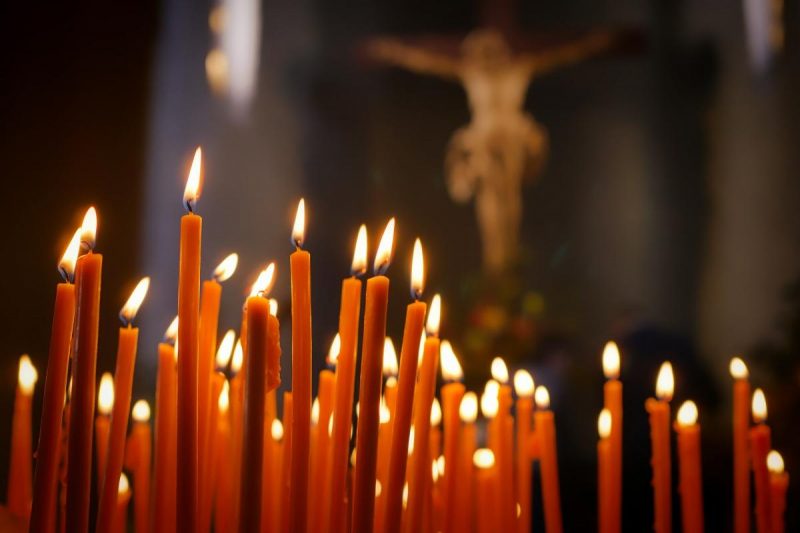
When does Holy Week 2025 begin?
Holy Week is the most important period of Lent, which prepares Christians for the celebration of Easter. In 2025, this week begins on April 13 and lasts until April 19 , and Easter is celebrated on April 20. Holy Week consists of several important days, each of which has its own deep spiritual meaning. This time is dedicated to prayer, purification of the soul, repentance and preparation for the holiday of the Resurrection of Christ, writes IZ.
Content
- When does Holy Week 2025 begin?
- Holy Week Traditions
- Palm Sunday (April 13, 2025)
- Holy Monday (April 14, 2025)
- Holy Tuesday (April 15, 2025)
- Holy Wednesday (April 16, 2025)
- Holy (Maundy) Thursday (April 17)
- Good Friday (April 18)
- Holy Saturday (April 19, 2025)
- What can and cannot be done during Holy Week?
Holy Week Traditions
Holy Week is a time when Christians deepen their spiritual life through prayer, fasting, confession, and preparation for the celebration of Easter. Each day of Holy Week has its own traditions and special rites.
Palm Sunday (April 13, 2025)
Palm Sunday is the day when believers remember the entry of Jesus Christ into Jerusalem. People greet him as a king, meeting him with palm branches, and in Ukraine, instead of palm trees, they sanctify a willow tree. The willow tree is a symbol of the rebirth of nature and God's grace, and also serves as a talisman for the home.
Holy Monday (April 14, 2025)
On Holy Monday, believers remember the cleansing of the temple by Jesus Christ from the merchants. This day symbolizes the cleansing not only of physical places, but also of the human soul. It is important to pay attention to prayer, reflection on one's life, and repentance.
Holy Tuesday (April 15, 2025)
Holy Tuesday is the day when Christ taught the people and exposed the unrighteous actions of the Pharisees. On this day, believers especially focus on the study of the Holy Scriptures, prayers and spiritual reflections. This day is also a time for repentance and gratitude for God's mercy.
Holy Wednesday (April 16, 2025)
Holy Wednesday commemorates the betrayal of Jesus Christ by Judas Iscariot. This is a time when believers especially pray for the forgiveness of their sins and the purification of their souls. In Ukraine, on this day, rites of consecration of oil are often held, symbolizing spiritual preparation for Easter.
Holy (Maundy) Thursday (April 17)
The day when Christians celebrate the institution of the Sacrament of Communion by Jesus during the Last Supper, when he distributed bread and wine to the apostles. The churches hold the service of the “Twelve Passionate Gospels”, dedicated to the suffering of Christ. Believers attend church for communion, dye eggs at home, bake Easter cakes and buy new clothes.
Good Friday (April 18)
The most mournful day of Holy Week, when Christians remember the crucifixion of Jesus on Golgotha. In churches, the Shroud is displayed – an image of Christ's body in the tomb, which believers can kiss. This is a day of strict fasting, when eating is allowed only after the Shroud is taken out.
Holy Saturday (April 19, 2025)
Holy Saturday is a day of waiting for the Resurrection of Christ. This is the time when believers prepare for the Easter celebration. In the evening, a service is held in churches, during which Easter cakes, eggs, and other dishes for the festive table are blessed. On Sunday night, Easter is celebrated – the Resurrection of Christ, symbolizing the victory of life over death.
What can and cannot be done during Holy Week?
What can be done:
- Pray and reflect : Holy Week is a time of prayer, reflection, and meditation. Believers should pray intensely and ask God for forgiveness and purification.
- Attend Churches : Holy Week is a time of special worship. It is important to participate in services, including the Liturgy and other prayers, which take place every day of the week.
- Confession and Communion : These are important rites for spiritual preparation for Easter. Confession and Communion allow you to purify your soul and spiritually prepare for the celebration of Christ's Resurrection.
- Observe fasting : During this period, one should limit food intake, especially meat, dairy products, and eggs. Fasting is an important element of cleansing and preparing the soul for the holiday.
- Engage in charity : This is a time for serving others, helping those in need, and praying for the poor and sick.
- Clean your home and prepare for the holiday : According to tradition, during Holy Week, you should thoroughly clean your home, prepare Easter cakes, Easter eggs, and other dishes for the holiday meal.
What not to do:
- No celebrations : Holy Week is a time of prayerful repentance, not celebration and merriment. All festivities and celebrations should be postponed.
- You cannot eat animal food : On these days, believers are forbidden to eat meat, dairy products, eggs, and other food that does not meet the strict requirements of fasting.
- You cannot engage in physical and worldly pursuits : Holy Week is a time for spiritual practices, so worldly pursuits, physical activity, and other activities should not distract from prayers.
- You can't have conflicts : At this time, you need to refrain from quarrels and conflicts. This is a time of reconciliation and forgiveness.
- No entertainment : Holy Week is not for entertainment, celebrations, or parties. It is important to maintain silence and modesty.
- No alcohol : Drinking alcohol goes against the spirit of this sacred time. Alcoholic beverages should be avoided during Holy Week.
As a reminder, we previously wrote about the Feast of the Praise of the Most Holy Theotokos.

